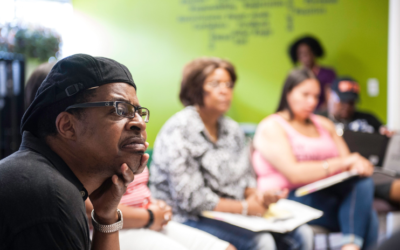Home > Emotional Intelligence in Education > Case Studies > Kentucky High School
EQ Assessment Measures Students’ Growing Self-Awareness
High school teachers developed an evidenced-based approach to social emotional learning which increased self-awareness – using robust assessments and the Self-Science curriculum in a controlled case.
Overview
Situation: Students in Eastern Kentucky frequently face poverty, family challenges, and feelings of isolation. Teachers in a high school (grades 9-12) worked with 50 students to assess the effectiveness of implementing EQ classes.
Solution: The researcher uses the SEI-YV as a pre/post to evaluate a 10 session (1-hr per week) emotional intelligence course in a mixed methods case study. Students were divided into a Treatment group and a Control group (25 students not exposed to the 10 week intervention).
Results: Students receiving the Self-Science Curriculum intervention demonstrated an increase in self-awareness, specifically in the EQ competencies of emotional literacy and recognizing patterns.
“I find this to be powerful. I have always been a friendly, fun-loving person but since I have become more aware of my feelings, my relationships with adults and my friends have improved beyond my expectations.”
“Something you said in one of the classes stuck with me. You said, ‘I want you to be able to see how the world sees you.’ That has really made a difference in how I act at school and at home. I try to think before I say or do anything.”
~students in the study
Situation
Eastern Kentucky is comprised of tiny towns tucked into valleys between the steep Appalachian Mountains in the heart of coal country. The region has some of the highest drop-out rates in the nation, as well as a high proportion of families living in deep poverty. Despite these challenges, there is a strong culture that values close family and community connections and traditions.
Solution
In this mixed methods case study, conducted in the short time frame of 10 weeks, a researcher evaluated the effect of teaching emotional intelligence on high school students’ EQ scores as measured by the SEI-YV, Six Seconds’ emotional intelligence assessment for youth, ages 7-18. The SEI-YV measured the students’ Emotional Intelligence before and after a ten-week intervention, 1 hour per lesson, based on the Six Seconds Self Science curriculum.
Results
In this brief 10-week study, the data suggest that it is possible to positively impact some components of EI in a high school class in rural Kentucky. Students’ skills in self-awareness, measured by emotional literacy and recognizing patterns, improved.
HAPPINESS
Through the program, one third of the students expressed being happier in their everyday lives
%
VALUING EQ
Forty-three percent of the Treatment Group felt that all students would benefit from EQ lessons
%
FUTURE GROWTH
Over 31% answered that they would like to participate in more EI lessons in the future.
%
Products & Services Delivered
SEL Youth Assessment
SEI-YV – Six Seconds Emotional Intelligence-Youth Version is a normed, validated online assessment of emotional intelligence, and is on CASEL and RAND lists of recommended tools. SEI-YV links EQ to five key outcomes for life success: achievement, health, efficacy, relationships, satisfaction:
SEL Curriculum
Self-Science – one of the world’s first social emotional learning (SEL) programs (recommended in Daniel Goleman’s 1995 book as one of the pioneers in EQ education), Self-Science is a developmental, experiential process for building social emotional skills.
Learn More About This Case
See More Cases
Growing a New Generation of Leaders at SunCulture
As an off-grid solar technology company, sustainability is at the heart of SunCulture’s work. Internally, that led to an investment in emotional intelligence training.
Empowering for Life Success: Workforce Training for Individuals Facing Racial or Socio-Economic Barriers Correlated with 24% Increase in Key Life Outcomes
This two-year study demonstrates the impact of Twin Cities R!SE’ signature Personal Empowerment Training, which teaches emotional intelligence for personal and professional success.
Breaking Out of the Box: Building Key Skills for Creative Customer Solutions
A major European insurance group commits to improving client loyalty by unlocking creativity and empathy with emotional intelligence.
Creating a Common Language on Campus: Students, Faculty and Staff Grow Emotional Intelligence with Innovative Curriculum
Can you improve emotional intelligence in higher education? This controlled study explores the impact of a 16-week semester course utilizing a social and emotional learning curriculum (SEL) for undergraduate students, faculty, and staff members at the University of Dubuque.
Developing Women Leaders for Greater Equity in East Africa
This study demonstrated a correlation between emotional intelligence and high performance for female CEOs and Board Members in Kenya.
Developing School Counselors’ Emotional Intelligence
Program participants’ overall emotional intelligence increased 22.7%, compared to less than 1% for the control group.







